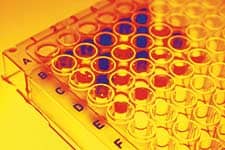Vitamin D deficiency is associated with a significant increase in lung transplant rejection, according to research conducted at Loyola University Health System (LUHS). These data were presented Monday at The American Society for Bone and Mineral Research 2010 annual meeting in Toronto, Ontario.
“Vitamin D deficiency is prevalent among lung transplant recipients,” Pauline Camacho, MD, study investigator and director of the Loyola University Osteoporosis and Metabolic Bone Disease Center said. “This study shed greater light on the serious impact that this deficiency has on lung transplant patients.”
Patients who undergo lung transplants are at risk for rejecting the organ, and 77% of these patients are vitamin D deficient. Researchers believe that vitamin D helps the immune system tolerate the organ. Thus optimal levels of this supplement are critical for positive outcomes.
This study evaluated 122 patients who underwent a lung transplant at Loyola between January 2005 and June 2008. Sixty-four patients were male and 58 were female with an average age of 49.2 years. Vitamin D levels were checked following the transplants. Of the 122 patients, 50% were vitamin D deficient, 18% were not deficient, and 32% were unknown. Vitamin D deficiency was associated with a significant increase in rejection for 51.7% of patients during the first year following transplant. Vitamin D deficiency also showed a trend toward increased airway inflammation in 16.7% of patients.
Researchers speculate that vitamin D also may improve the health of lung transplant patients. Further studies will evaluate the effect of vitamin D therapy on short- and long-term lung transplant rejection rates, lung function, and long-term survival.
Thomas Cascino, third-year medical student at Loyola University Chicago Stritch School of Medicine (Stritch); Charles Alex, MD, FCCP, program director for lung transplant at LUHS; and Ramon Durazo, PhD, assistant professor of preventive medicine and epidemiology at Stritch, were also study investigators.
Source is Loyola University Health System


